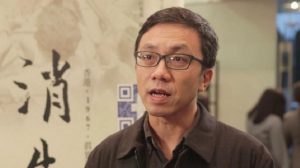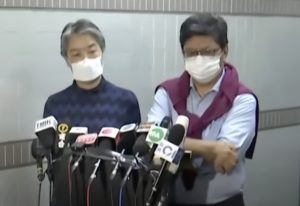London – The free press in Hong Kong has been “almost completely dispersed” as a result of the censorship and persecution of journalists and media outlets, according to a new report by British NGO Hong Kong Watch.
According to the document, the independent media space is occupied by the pro-Beijing state media, which follows the narrative set by the Chinese Communist Party, as is the case with government-controlled newspapers in China.
At the same time that the report was published, the Hong Kong Foreign Correspondents Association (FCCHK) announced the cancellation of its annual Journalism and Human Rights award, the winners of which will be announced on World Press Freedom Day, 3 May.
Censorship of domestic and foreign journalists in Hong Kong
Hong Kong ranked 148th World Press Freedom Index released by Reporters Without Borders (RSF) on 3 May. Brazil ranks 11th and is among the 10 worst countries in Latin America.
While the RSF methodology has changed and the study authors suggest no comparison with last year, the distance between positions is significant, even without accounting for possible interference from the new criteria: In 2021, Hong Kong was ranked 80th.
In analyzing the country’s status in the World Press Freedom Index, the organization said:
“The Hong Kong Special Administrative Region of the People’s Republic of China, once a bastion of press freedom, has experienced an unprecedented setback since 2020, when Beijing passed a National Security Law designed to silence independent voices.”
This is what the report “On the Line of Shooting: Repression of Press Freedom in Hong Kong” shows in detail. The document was penned by Hong Kong Watch co-founder and CEO Benedict Rogers, a human rights activist and writer specializing in Asia.
He lived and worked as a journalist in Hong Kong from 1997 to 2002 and has previously worked in China.
Rogers’ extensive knowledge of the Asian continent allowed him to interview more than 10 Hong Kong journalists currently living in exile to portray the current media situation in the region.
Reports from all major global and local press freedom associations were also considered.
The document details the various methods Hong Kong authorities have used to restrict press freedom in the city. Some of them:
- Police violence against media workers;
- Police raids on newsrooms;
- closure of independent media;
- change of management at public broadcasters such as Radio and Television Hong Kong (RTHK);
- Brutal laws that imprison reporters and editors.
The report points out that the crackdown on the press has developed since 2019 and intensified with the enactment of the National Security Law on 1 July 2020.
The document states that since then, nearly all independent and pro-democracy media outlets have been forced to close, 18 journalists have been detained, and at least 12 reporters and media executives are in jail awaiting trial.
“The Hong Kong government is using a combination of outdated common law charges such as ‘rioting’ under the National Security Act and the Crimes Ordinance to ensure justice against journalists.”
read it too
Hong Kong continues to put pressure on the press with the arrest of one of its best-known journalists
The survey indicates that more than 50 non-governmental organizations, including political parties, trade unions and media groups, have been shut down since the National Security Law was enacted.
One of the few organizations still resisting is the Hong Kong Journalists Association (HKJA), but the NGO cites “real fears” that it may be the government’s next target.
“In January 2022, the Trade Union Registry (RTU) launched an investigation into the HKJA, demanding that it justify how relevant some of the group’s activities are to its goals.”
“Last year, Security Secretary Chris Tang requested that the group release its membership list. HKJA President Ronson Chan told The Daily Telegraph: “I am mentally prepared for more police interrogations.
Hong Kong Watch claims that several members of the HKJA Executive Committee have already left the former colony for fear of reprisals and detention.
The document also highlights that Hong Kong police, under the guise of the National Security Act, raided the newsrooms of pro-democracy publications Apple Daily and Stand News, forcing both to close in 2021.
With the public broadcaster RTHK, the action was different. The NGO states that the tool has lost all independence and editorial neutrality, has shut down at least 12 programs, deleted most of its archive from more than a year ago, deleted old posts on Twitter, and banned public comments on the social network.
“The Hong Kong Police Force has introduced a new definition of ‘journalist’, which effectively puts restrictions on freelance journalists, online journalists, student journalists and citizen journalists.”
The report states that official actions by the Hong Kong government have forced media groups to implement “extensive self-censorship”.
There are also barriers that make it difficult for journalists to work in public institutions, such as new restrictions on access to public documents.
In addition, the government is proposing to introduce a “fake news” law that would further restrict press freedom, warns Hong Kong Watch. similar law imposed on Russia by the start of the Ukrainian War. and has already arrested dozens of journalists, while the international press has driven their teams out of the country.
“The press freedom situation in Hong Kong is dire,” the NGO report summarizes.
“The international community must raise its voice, especially in Hong Kong, to protect journalists who continue to work with the courage to conquer a limited space and demand the release of those arrested or accused.”
read it too
Chinese edition leads to closure of third newspaper in Hong Kong within six months
Hong Kong’s free press undermined by pro-Beijing media
Another point of pressure and censorship of the Hong Kong press comes from the pro-Beijing media colleagues themselves, who continue to attack and harass critics.
The Hong Kong Watch report gives examples of how the city’s free press has shrunk in the face of constant harassment from the government and pro-Beijing organizations.
Chris Wong, a former TVB news anchor, described the organization’s attempts to cover the attack on pro-democracy counselor Andrew Chiu, whose ear was bitten in November 2019. The report stated that the attack was proven with photographs and videos.
“But when Chris Wong came to cover the attack, he saw that he was asked to report a very different and very strange version.”
“The script the editor provided said that Chiu’s ear somehow naturally fell out. Nobody did anything, it was not a bite and the ear fell to the ground. “The editors did not want to cover up the violence by pro-Beijing ‘blue’ supporters,” he said.
Many people were injured in the knife attack that took place in front of the Cityplaza shopping center in Hong Kong. One of them was pro-democracy district councilor Andrew Chiu, who was brutally bitten off by the perpetrator.
Local elections are in three weeks. pic.twitter.com/lz4Nz4Zh10
— Alejandro Alvarez (@aletweetsnews) November 3, 2019
Wong also said protesters were ordered to say “black shirts” instead of “protesters” and not cover their press conferences – while police and government press conferences were shown in full.
“Unfortunately, TVB has tarnished the reputation of its journalists, and because of TVB’s reputation, all of its former employees live and work under public criticism.”
The report also detailed various acts of police brutality against journalists during the protests, including some professionals who seemed frightened by the agents.
“We were sitting on the ground and we took off our gear, masks, helmets and other protective gear,” said one photojournalist. South China Morning Post about covering up a protest.
“The police came and threw tear gas directly at us. The hatred shown by the police to the media was shocking.”
The document said the pressure and intimidation of Hong Kong media was encouraged by pro-Beijing organizations, who are now taking advantage of the industry’s shrinkage.
“In the absence of pro-democracy media, it’s worth considering the effects of the erosion of press freedom and how this creates more space for pro-Beijing media.”
read it too
‘Mini-Trumps’ undermine global press freedom, RSF director warns
The organization also accuses broadcasters of “making propaganda for the Chinese Communist Party regime and the Hong Kong government, threatening their critics with various forms of harassment, both in the press and in the press.”
Hong Kong Watch urged international governments to offer assistance to journalists fleeing Hong Kong who wish to emigrate and continue their Cantonese studies abroad.
It also called on governments to use sanctions and other forms of pressure to encourage the Hong Kong government to restore media freedoms.
“The international community must not allow those responsible for these violations to go unpunished and without consequences.”
As an example of the extent of censorship in Hong Kong, the NGO itself came into the government’s firing line. In March, the British organization was formally notified by authorities that the website “posed a threat to China’s national security” and violated the National Security Act.
The government has called for the site’s suspension for Hong Kong Watch CEO Benedict Rogers, under the threat of fines and up to three years in prison.
“Using the cross-border clause of the National Security Act, set out in section 38 of the act, threatening a foreign activist and organization constitutes a new low point and poses a direct threat to free societies and potentially media freedom beyond the borders of Hong Kong Kong.”
read here The full Hong Kong Watch report.
Human rights award canceled
The decision to cancel the Hong Kong-based annual Human Rights Award for foreign journalists in the face of censorship was attributed to the environment of “significant uncertainty” experienced by the Foreign Correspondents Association over the past two years.
The aim was to protect journalists from the risk of unintentionally violating the National Security Act.
However, the decision was not accepted by everyone. Some professionals who are members of the association opposed the cancellation and even left.
read more
source: Noticias


